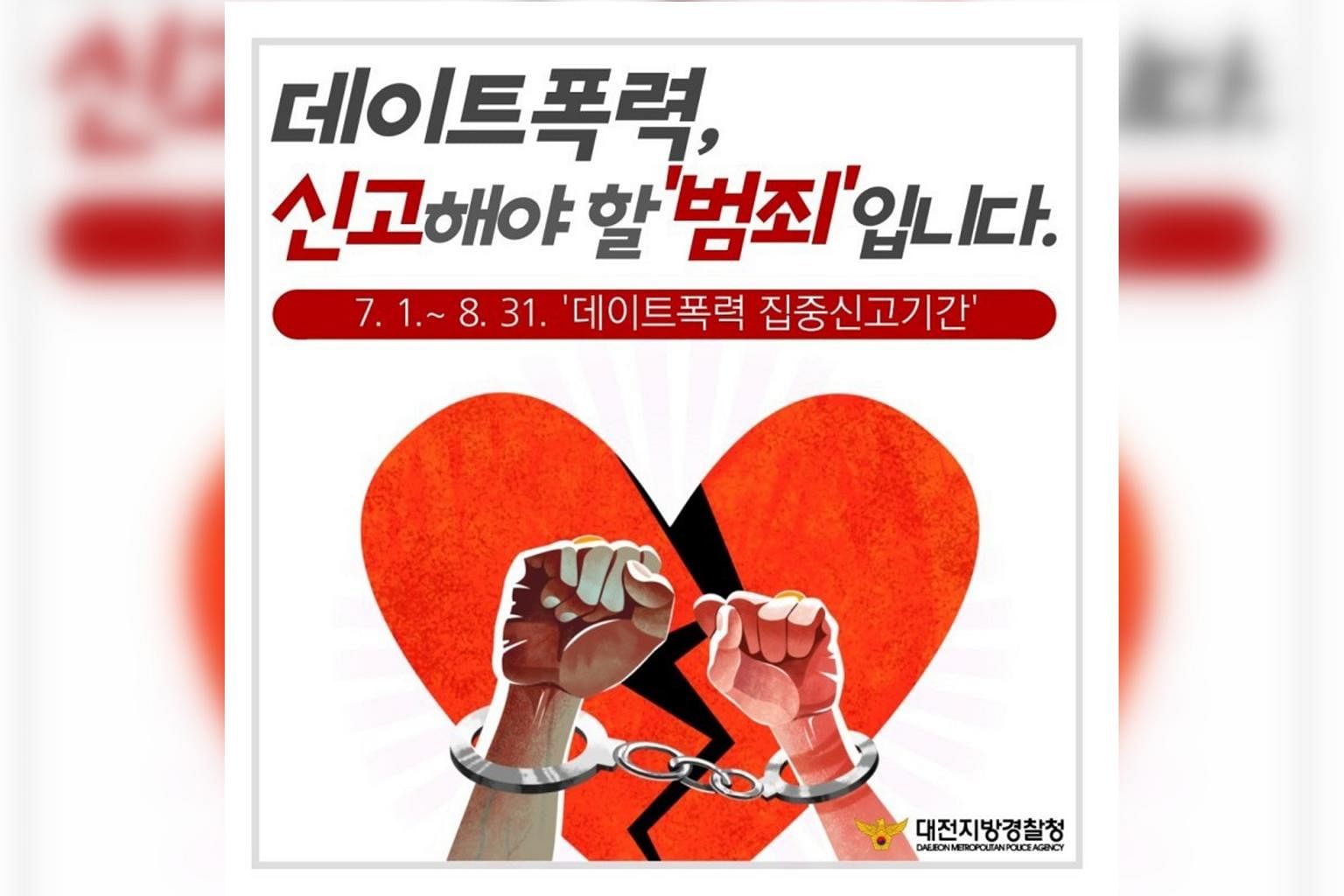SEOUL - Like a boyfriend from hell, he stalked her, abused her and criticised her in front of her colleagues.
"I can't live a normal life. Whenever I see a car similar to his, I'd feel so scared and tremble so much," the woman wrote on the South Korean Internet portal Naver, seeking advice from lawyers. "I'm going to report him."
Another woman posted photos of her friend's bruised arms and legs and asked for advice on how her friend could get help.
Yet another woman complained that her live-in boyfriend smashed up things in her house and hurt her every time she tried to break up with him.
"I want to kick him out of my house. I don't want to live like this any more," she wrote.
Such accounts of dating violence are common in deeply patriarchal South Korea, a country which ranks among one of the lowest in the world for gender equality.
Nine out of 10 of women living in Seoul who took part in a survey in 2018 admitted that they had been abused and hurt, either physically or psychologically, by their male partners during dating.
Women used to suffer in silence, fearful of repercussions. But now, emboldened by the global #MeToo movement against sexual harassment, they are starting to speak out.
The number of cases of dating violence rose to 19,940 last year, up from 14,136 in 2017, the National Police Agency (NPA) has said.

About half of the assailants were booked on charges such as assault (7,003 cases), confinement and intimidation (1,067), sexual violence (25) and murder (10). The rest of the cases ended up with either police warnings or were resolved privately.
Superintendent Tak Kwang-o told The Sunday Times that an annual police campaign against dating violence has successfully raised public awareness and encouraged more women to report their abusers.
He said the campaign was first introduced in 2016 to address an emerging social phenomenon of conflicts between lovers, some of which involved celebrities.
Hip-hop singer Iron, for one, was charged for assaulting his girlfriend in 2016. He was eventually sentenced in 2018 to eight months in prison, two years of probation, and 80 hours of community service.
K-pop star Goo Ha-ra, on the other hand, sued her boyfriend for assault and blackmail, for which he received an 18-month jail term last year.
Mr Tak said the police are doing more to raise awareness about dating violence, such as putting up campaign banners at malls, beauty salons, cafes and other places frequented by women, as well as on popular Web portals and social media sites.

Workshops are also conducted within the police force to teach officers on how to crack down on such abuse and protect victims, although these have gone online this year due to concerns over the Covid-19 pandemic.
The campaign designates July and August as an "intensive reporting period".
Mr Tak explained that the two summer months draw about 30 per cent more reports than other times of the year, as couples engage in more outdoor activities and go on vacation together, leading to more possible conflicts that can trigger abusive behaviour.
The higher temperatures can also cause tempers to flare more easily and lower one's ability for self restraint, he added.
"We are focusing on reporting because it can raise awareness and make people realise it is a crime and not a personal problem. It also plays a role in preventing more serious crime that can arise from dating violence," he said.
Experts said dating violence is a relatively new phenomenon in South Korea, and there are no specific laws targeting it yet. Anti-stalking Bills have been stuck in the male-dominated Parliament for years, and activists have been calling for more to be done to protect women.
Ms Kim Da-seul from the Korea Women's Hotline said 17.6 per cent of the roughly 2,000 calls it received last year were about abusive dating relationships.
The term "dating violence" did not exist when the hotline was founded in 1983, she added. Violence against women arising from intimate relationships started gaining attention in the 1990s, but it was only in the past few years that people rallied against dating violence.
Ms Kim said the hotline service would provide counselling and emotional support to callers, as well as information about social assistance, and recommend legal advice if needed.
"Sometimes it is hard to understand what is dating violence because it can be perceived as a mere fight between two lovers," she told The Sunday Times.
"Most victims have already tried their best to resolve the problem but realise there is no way out. That's why they call for counselling, because they need external help. We will assure them that the situation is not their fault, and that it's not because of what they did or did not do."
Lawyers would advise victims to gather hard evidence against their assailants, such as abusive text messages, medical reports and closed-circuit television footage, before they make a report.
Supt Tak said police would issue written warnings to the assailants as a form of deterrence, as well as keep a record of abusive behaviour.
"The warning is an effective way to raise awareness and makes the victim feel like you are not alone, the government is behind you."
Additional reporting by Jane Lee.


